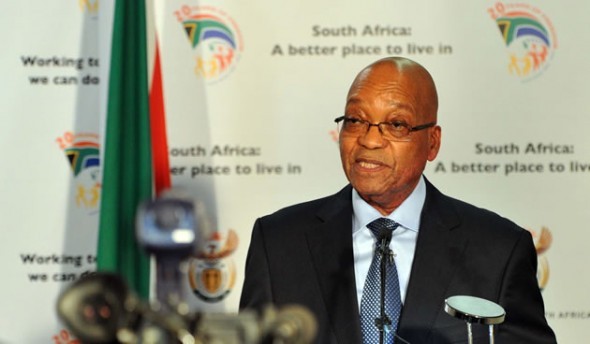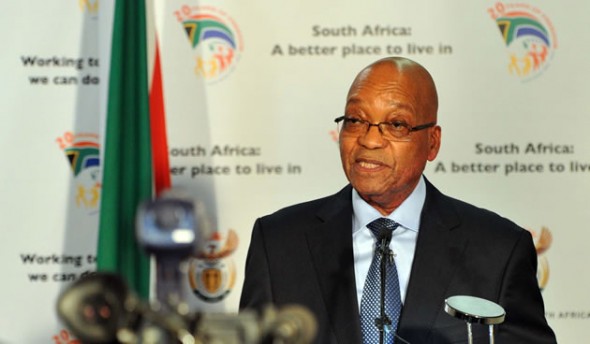
OPINION: Cabinet reflects ANC’s difficult internal politics, now what is best for SA?
South African cabinet ministers named yesterday by President Jacob Zuma were, in the main, not chosen because of their technical knowledge, skill or sector experience. Rather, Sunday’s promotions, demotions and new appointments reflect the need to reward the loyal, appease some opponents and punish others, and perhaps most importantly, reflect the myriad ethnic and class […]

South African cabinet ministers named yesterday by President Jacob Zuma were, in the main, not chosen because of their technical knowledge, skill or sector experience. Rather, Sunday’s promotions, demotions and new appointments reflect the need to reward the loyal, appease some opponents and punish others, and perhaps most importantly, reflect the myriad ethnic and class constituencies that make up the ANC.

This explains the fact that the already bloated cabinet grew yet again, pushing up both the costs of running the government and the costs of doing business with it. Empires are being built and functions are being duplicated in the process. How can you justify full and separate ministries for trade and industry, economic development (created by Mr Zuma in 2009) and small business, created at the weekend?
In 2004, at the start of former President Thabo Mbeki’s second term, the cabinet comprised 28 members. Mr Zuma’s first cabinet had 34 members and there are now 35.
By contrast, to run the world’s biggest economy, US President Barack Obama has a 23-strong cabinet and the Chinese State Council, which oversees the soon-to-be largest economy is made up of 35 people.
By global standards, South Africa’s ministers are also very well paid. Each one of the ministries will also come with all the usual bells and whistles and, even if all ministers take heed of treasury imprecations that they count the cents (which experience tells us they will not) there can be no argument that this will suck up money that could be better spent elsewhere.
And that is just the new departments. The Presidency itself is also expanding at an alarming rate. As Business Day pointed out this morning, the budget of the Presidency has soared from R257m in 2007 when Thabo Mbeki was president, to R329m in 2009 just before President Jacob Zuma took power to R727m in 2010, R959m in 2011 and R1.1bn for the current financial year. It is forecast to rise to R1.3bn by 2016-17.
The political trade-offs made by Mr Zuma are not a uniquely South African phenomenon and the ANC cannot be singled out as doing something that its peers elsewhere do not do, or, at least would not do if their electorates would let them get away with it.
Most, if not all, democracies work along the same lines and while some of the outcomes may seem bizarre to outsiders, if you take the time to consider where the political fault lines lie, then the president’s choice of ministers makes more sense than it may do at first glance.
However, where South Africa differs from other successful democracies is that the bureaucratic machinery that runs the various organs of state is weak, giving political heads a far greater influence on the day-to-day running of their departments than would be ideal. Rather than being independent of political parties South Africa’s bureaucracy has been captured by the ruling party. Where it should implement policy not politics, it often does the reverse.
More often than not it lacks the professionalism and internal strength needed to guide the politicians in the exercise of their duties.
This is why having avowed socialists in charge of industrial policy and economic development or a woefully inept former fisheries minister in charge of energy, one of the most important portfolios of them all, matters so much.
Rather than pulling together the best team for the job, the group of men and women which will oversee the running of the government, the implementation of the ruling party’s economic and social policies and (theoretically at least) the delivery of its election manifesto, reflect the compromises needed to keep an organisation the size of the African National Congress intact.
As is now the norm with all major events, twitter was immediately abuzz with opinions and thoughts on where Mr Zuma had got it right and where he had erred.
Disapproval was widespread, but it was by no means the only reaction. On hashtag #Cabinet2014, @Edwin Matlapeng said “When reactionary private sector [and] their analyst are happy about cabinet appointments it normally means the poor must be worried.”
It’s 22 years since the famous words “It’s the economy, stupid” was posted on the war room wall of former US President Bill Clinton’s campaign war room. The phrase came to mean that ultimately, all politics boils down to economics.
The maxim has been proved repeatedly across the democratic world, including in South Africa’s recent general elections. If people feel they are getting poorer, or not being made richer at a rate that is acceptable to them, then they shift allegiance to somebody who they believe will do better.
Growing support for the Democratic Alliance and the Economic Freedom Fighters is fundamentally driven by economic performance and any lack of delivery on this front by the ruling party opens the way for others to come in on the back of promises that they will do better.
However, the significance of the phrase, or the reasons for the opposition’s better performance earlier this month, seems not to have played too significant a role in President Jacob Zuma’s thinking.
The opposition must be pleased. But before they get too smug, I’d remind them of the story of Trevor Manuel who is out of cabinet for the first time in 20 years. When he was named finance minister in 1996 nobody thought the firebrand with a background in civil engineering would have either the brains or the nerve to run the finances of a complex modern economy.
When Mr Manuel was finally shifted to one side by Mr Zuma in 2009 he was widely accepted as having been one of the world’s finest. One can only hope that at least some of the new ministers will follow his example. After all, that is what the economy needs.
Below is the full list of South African ministers and their deputies:
Deputy President
– Cyril Ramaphosa
The Presidency
– Minister Jeff Radebe
– Deputy Minister Buti Manamela
Women in the Presidency
– Minister Susan Shabangu
Justice and Correctional Services
– Minister Michael Masutha
– Deputy Minister responsible for justice and constitutional development John Jeffery
– Deputy Minister responsible for correctional services Thabang Makwetla
Public Service and Administration
– Minister Collins Chabane
– Deputy Minister Ayanda Dlodlo
Defence and Military Veterans
– Minister Nosiviwe Mapisa-Nqakula
– Deputy Minister Kebby Maphatsoe
Home Affairs
– Minister Malusi Gigaba
– Deputy Minister Fatima Chohan
Environmental Affairs
– Minister Edna Molewa
– Deputy Minister Barbara Thomson
State Security
– Minister David Mahlobo
– Deputy Minister Ellen Molekane
Telecommunications and Postal Services
– Minister Siyabonga Cwele
– Deputy Minister Hlengiwe Mkhize
Police
– Minister Nkosinathi Nhleko
– Deputy Minister Maggie Sotyu
Trade and Industry
– Minister Rob Davies
– Deputy Minister Mzwandile Masina
Finance
– Minister Nhlanhla Nene
– Deputy Minister Mcebisi Jonas
Agriculture, Forestry and Fisheries
– Minister Senzeni Zokwana
– Deputy Minister Bheki Cele
Water and Sanitation
– Minister Nomvula Mokonyane
– Deputy Minister Pam Tshwete
Basic Education
– Minister Angie Motshekga
– Deputy Minister Enver Surty
Health
– Minister Aaron Motsoaledi
– Deputy Minister Joe Phaahla
International Relations and Cooperation
– Minister Maite Nkoana-Mashabane
– Deputy Minister Noma-India Mfeketho
– Deputy Minister Lluwelyn Landers
Rural Development and Land Reform
– Minister Gugile Nkwinti
– Deputy Minister Mcebisi Skwatsha
– Deputy Minister Candith Mashego-Dlamini
Higher Education and Training
– Minister Bonginkosi ‘Blade’ Nzimande
– Deputy Minister Mduduzi Manana
Economic Development
– Minister Ebrahim Patel
– Deputy Minister Madala Masuku
Transport
– Minister Dipuo Peters
– Deputy Minister Sindi Chikunga
Mineral Resources
– Minister Ngoako Ramathlodi
– Deputy Minister Godfrey Oliphant
Social Development
– Minister Bathabile Dlamini
– Deputy Minister Henrietta Bogopane-Zulu
Public Enterprises
– Minister Lynne Brown
– Deputy Minister Gratitude Magwanishe
Sport and Recreation
– Minister Fikile Mbalula
– Deputy Minister Gert Oosthuizen
Labour
– Minister Mildred Oliphant
– Deputy Minister Inkosi Patekile Holomisa
Arts and Culture
– Minister Nathi Mthethwa
– Deputy Minister Rejoice Mabudafhasi
Public Works
– Minister Thulas Nxesi
– Deputy Minister Jeremy Cronin
Small Business Development
– Minister Lindiwe Zulu
– Deputy Minister Elizabeth Thabethe
Energy
– Minister Tina Joemat-Peterssen
– Deputy Minister Thembi Majola
Science and Technology
– Minister Naledi Pandor
Cooperative Governance and Traditional Affairs
– Minister Pravin Gordhan
– Deputy Minister responsible for provincial and local government Andries Nel
– Deputy Minister responsible for traditional affairs Obed Bapela
Communications
– Minister Faith Muthambi
– Deputy Minister Stella Ndabeni-Abrahams
Human Settlements
– Minister Lindiwe Sisulu
– Deputy Minister Zoe Kota-Hendricks
Tourism
– Minister Derek Hanekom
– Deputy Minister Thokozile Xasa